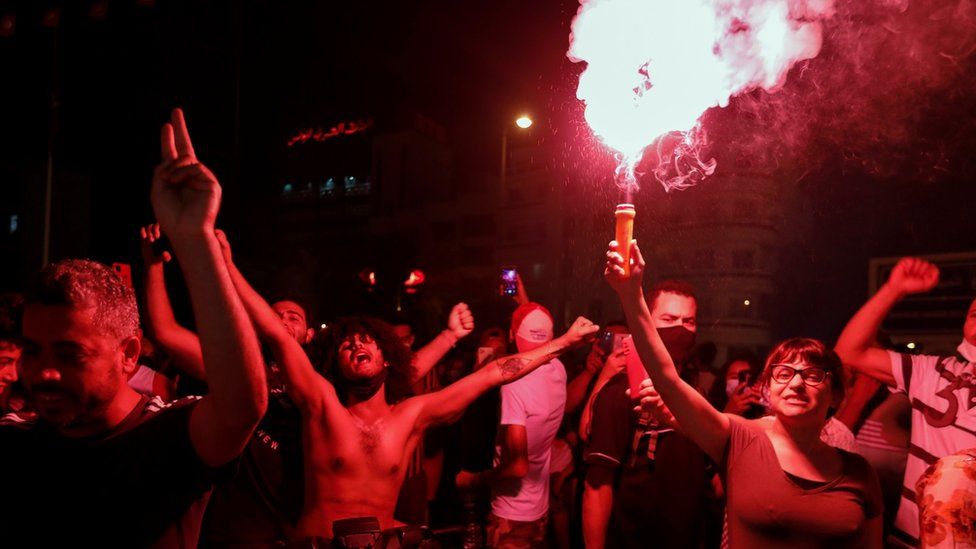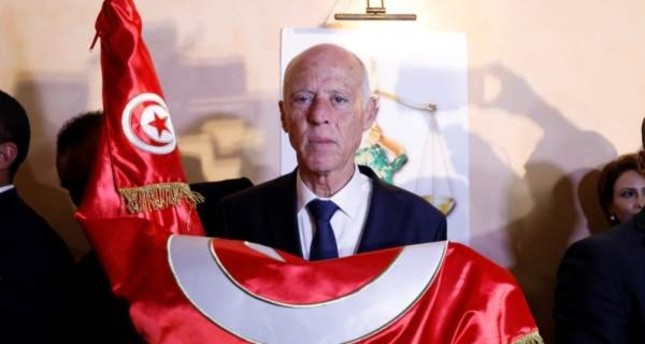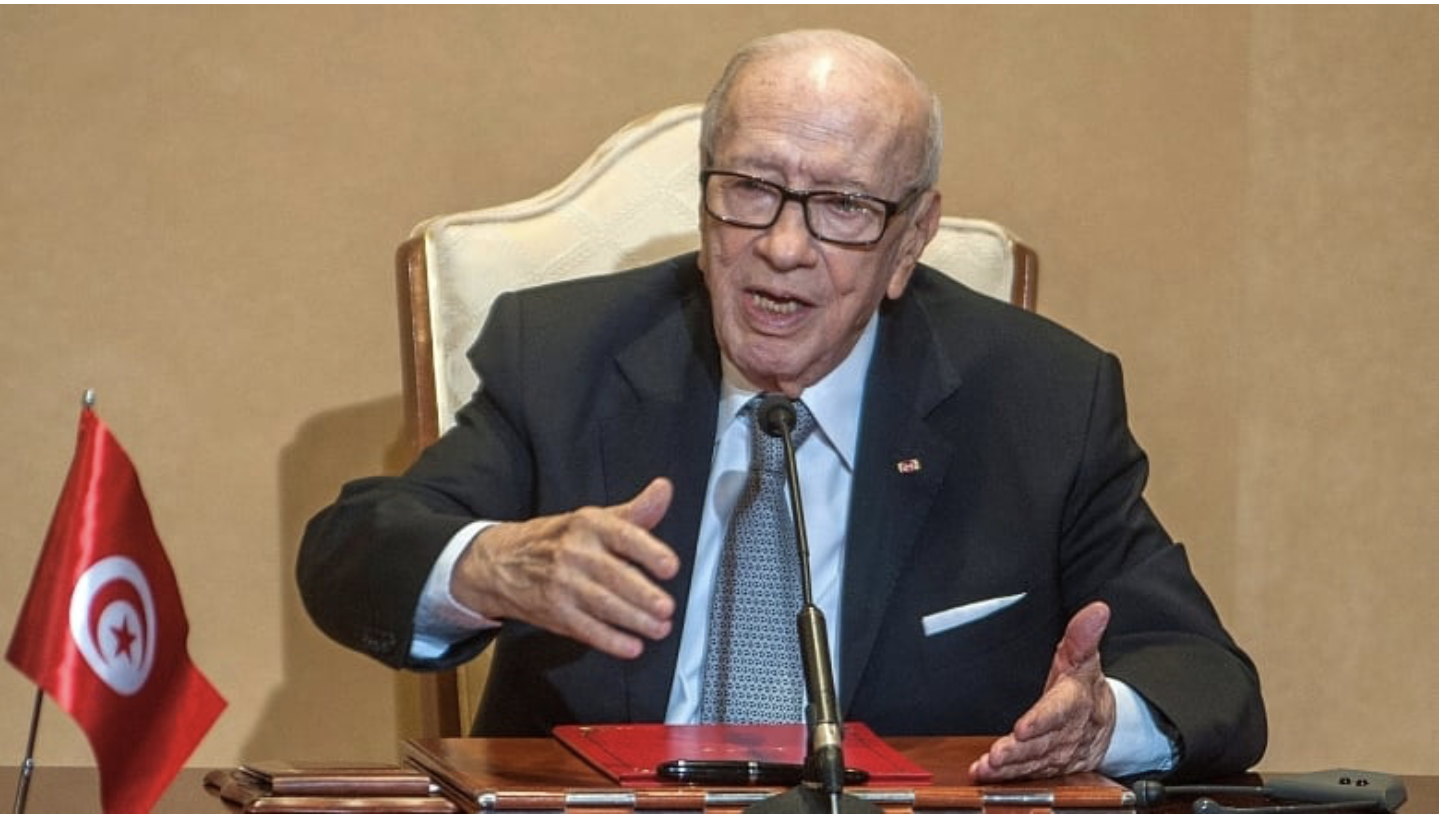This article is more than
5 year oldTunisia’s long-time leader Ben Ali, ousted by the Arab Spring, dies at 83
The man many dubbed “Benavie” – loosely translated, “Ben Ali for Life” – is dead.
Nearly a quarter century after rising to power in Tunisia, Zine el-Abidine Ben Ali would ultimately cede control on January 14, 2011 – at the dawn of the uprising that would spread from Tunisia throughout the Arab world – leaving behind a once-heralded Tunisian economic model that had run out of steam and a people thirsty for freedom and change.
Forced to flee, Ben Ali found exile in Saudi Arabia, taking refuge with family members in Jeddah on the Black Sea. In 2018, after several court proceedings that he did not attend, the exiled autocrat was sentenced in absentia to a total of more than 200 years in prison on charges including murder, corruption and torture.
A promising start
Born September 3, 1936, one of 11 children from a modest family in Hammam Sousse on the northeastern coast, Ben Ali got his first taste of politics early on when he joined the nationalist Neo Destour (Liberal Constitutional) party.
After graduating from military schools in France – the Napoleon-founded Saint-Cyr Special Military School and the School of Applied Artillery in Châlons-sur-Marne – Ben Ali pursued his studies in the United States, where he earned a degree in electronic engineering. He returned to Tunisia and occupied a variety of roles, in the army and abroad.
Called back to Tunis in 1984 in the wake of food riots, he took charge of national security. As a member of the political bureau of the Socialist Destourian Party (PSD), he began an expeditious rise to power as interior minister in May 1987 and then, in October of the same year, as prime minister.
Ben Ali would occupy the premiership for just six weeks, but it would open the door to the highest rung of power. Incumbent president-for-life Habib Bourguiba, the architect of Tunisia’s independence and the Tunisian Republic’s first head of state, was soon after declared senile and unfit to rule on the basis of a November 7 medical report. As Bourguiba’s constitutional dauphin, Ben Ali succeeded the elderly leader. Some deemed the move a “medical coup d’état”, others considered it a “silent revolution” that paved the way for change.
Ben Ali then took charge of the PSD, transforming it into the Democratic Constitutional Rally (RCD) in 1988. He abolished the presidency-for-life and was elected Tunisia’s president with 99.27 percent of the vote on April 2, 1989 – a score he would beat upon his re-election five years later with 99.91 percent. He had stood as the lone candidate in both elections.
In 2002, via referendum, Ben Ali had Tunisia’s constitution amended to abolish presidential term limits and raise the age ceiling in order to stand again in 2004. He won that election at age 68 with 94.4 percent of the vote. He was re-elected once again in 2009 with a score of 89.62 percent.
From model of stability to autocracy
At the dawn of his leadership, Ben Ali was considered, in Tunisia and beyond, a people’s head of state. He made economic development a priority, promoted investment and led a privatisation drive, notably in the industrial and tourism sectors, which would experience strong growth. He also worked to foster social advancement, principally in education – student enrolment grew tenfold in 25 years – and women’s rights.
In the face of rising fundamentalism in the 2000s, Ben Ali launched a violent campaign against Islamists. The repression was very aggressive and endorsed not only by Tunisian democrats but also by Western powers, chiefly the United States and France.
The Tunisian model’s stability struck a glaring contrast with neighbouring Algeria, saddled as it was with violence, terrorism and civil war. Thus Tunisians, at first, were willing to accept the heavy-handedness that came with the crackdown on Islamists. For most foreigners, Ben Ali’s Tunisia remained above all a sunny holiday destination, one that was welcoming millions of Europeans every year.
Despite complaints from opposition leaders and activists, who denounced encroachments on free speech and the jailing of political opponents, it was not until the beginning of the 2000s that international human rights groups began qualifying the Ben Ali regime as “authoritarian”. Detractors accused him of reducing dissident voices to silence. The press was monitored and liberties curtailed.
Ben Ali was also accused of monopolising the country’s riches and its high-ranking jobs for his entourage. At the apex of the state and of the dominant party, the leader relied on his family – his brothers and sisters, his daughters, his sons-in-law as well as his second wife, Leïla Trabelsi. Considered more powerful than any minister, and overseeing a system of nepotism and corruption, Trabelsi is thought to have had a stranglehold on entire sectors of the Tunisian economy.
Downfall
Ben Ali’s lengthy reign came to a head at the end of 2010. On December 17 of that year, Mohamed Bouazizi, a young street vendor in Sidi Bouzid, self-immolated in protest after authorities accused him of not having the proper permits, confiscated his weighing scales and overturned his vegetable cart. Bouazizi’s act of desperation moved the nation as a whole and sparked a popular protest movement that would rattle the status quo, first in Tunisia and eventually the region at large.
Appearing on television on January 10, 2011, Ben Ali denounced the protesters’ “terrorist acts” while promising to create 300,000 jobs by 2012. On January 13 he again took to the airwaves, announcing new measures meant to guarantee press freedoms and free political expression and renouncing the prospect of running for office again in 2014.
But the address wasn’t enough to slake popular anger. The following day, January 14, with his back to the wall, Ben Ali announced the sacking of his government and pledged to hold new legislative elections within six months. But before the day was out, under pressure from the army and many in his own retinue, Ben Ali finally left Tunisia for Saudi Arabia, ending his 23-year reign of power.
Newer articles
Ray J on Why Diddy's Friends Haven't Come to His Defense: 'I Think A Lot of People Are Trying to Understand It'
Taylor Swift’s music returns to TikTok even as label fights over artist compensation
Khloe Kardashian hounded after OJ’s death
Biden vows 'ironclad' support for Israel amid Iran attack fears
Why Israel is risking a dramatic escalation with Iran
Netflix hit inundated with complaints
Trump offers conditions for Ukraine aid renewal
India calls for ‘immediate de-escalation’ amid Israel-Iran tensions
O.J. Simpson, former football star acquitted of murder, dies at 76




